Publications
When there are new challenges to rise up to, KAIST CAF will be at the very forefront.
Publications
Total : 13
-
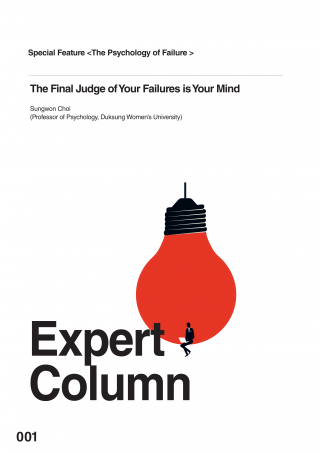 Expert ColumnThe Final Judge of Your Failures is Your Mind
Expert ColumnThe Final Judge of Your Failures is Your Mind2023-12-22
Sungwon Choi (Professor of Psychology, Duksung Women’s University)
Special Feature <The Psychology of Failure The Final Judge of Your Failures is Your Mind Sungwon Choi (Professor of Psychology, Duksung Women’s University) The world is changing at a breakneck pace. Information is spreading faster than ever, and technological advancement is accelerating. However, such rapid developments may be forcing us to make decisions and think far too quickly. It is inadvisable to respond to the inevitable experience of failure with hasty conclusions. Your failure may have resulted due to an unimaginable number of variables, some of which may even be of a cosmic nature. Being forced to draw hasty conclusions can cause people to attribute the cause of their failures to societal inequality or the ineffectualness of one’s circumstances. Certainly, facing the world alone is undeniably challenging, but giving up quickly only accelerates the erosion of one’s resolve. Sometimes, it is necessary to take as much time as necessary to accept one’s failures and sift through the complex web of meaning lying within. Sometimes, the path to success is the slower and less straightforward route.
Origin
Download -
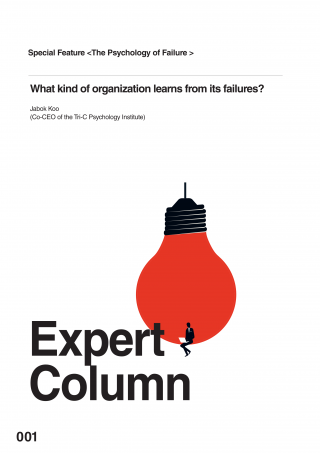 Expert ColumnWhat kind of organization learns from its failures?
Expert ColumnWhat kind of organization learns from its failures?2023-12-20
Jabok Koo (Co-CEO of the Tri-C Psychology Institute)
Special Feature <The Psychology of Failure> What kind of organization learns from its failures? Jabok Koo (Co-CEO of the Tri-C Psychology Institute) Leaders need to constantly make sure their organization’s systems and policies are helping to build an environment where people can be protected and safe when taking on challenges or even after failing. Consistency is vital, as that will allow a new organizational culture to take root. Unlike a company’s motto or ideology, an organization’s culture is shaped by the collective experiences of its members during their time in the group as well as the beliefs they ultimately adopt. In other words, the members learn the culture of an organization by seeing who gets promoted, who gets paid more, and who is given roles of responsibility. Once they accept the culture, they start believing in it and work accordingly. This is because the essence of an organizational culture stems from the unspoken beliefs (subconscious beliefs, perceptions, thoughts, and emotions) residing in the minds of its members. These beliefs are shared with others as people work and interact with each other within their organization, and they are the most important factor that can determine whether a company succeeds or fails.
Origin
Download -
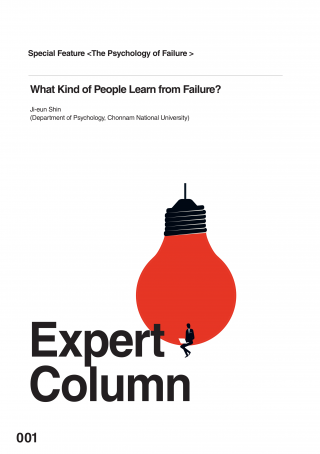 Expert ColumnWhat Kind of People Learn from Failure?
Expert ColumnWhat Kind of People Learn from Failure?2023-12-20
Ji-eun Shin (Department of Psychology, Chonnam National University)
Special Feature <The Psychology of Failure > 5 What Kind of People Learn from Failure Ji-eun Shin (Department of Psychology, Chonnam National University) Why is it important to learn from failure? Lessons gained from failure are likely to be inherently different in nature to those that can be learned from success, and they have unique characteristics that set them apart. In contrast to how success stories tend to share many similarities, failure experiences can vary greatly in their causes and circumstances. Therefore, our lives can become more enriched and balanced by learning from our failures. The failure to learn from failure does more harm than just limiting one’s learning opportunities: people can learn a great deal from others, so if an individual does not learn from their shortcomings and mistakes, the lessons embedded in those failures cannot be disseminated throughout society. In other words, society as a whole misses out on the opportunity to learn from failure. In this sense, we can consider an individual’s failure as a social asset, and a culture that embraces and actively shares such assets will serve as a key foundation upon which entire communities can grow.
Origin
Download -
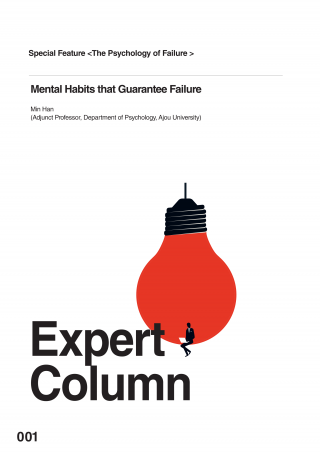 Expert ColumnMental Habits that Guarantee Failure
Expert ColumnMental Habits that Guarantee Failure2023-12-18
Min Han (Adjunct Professor, Department of Psychology, Ajou University)
Special Feature <The Psychology of Failure > 4 Mental Habits that Guarantee Failure Min Han (Adjunct Professor, Department of Psychology, Ajou University)
Origin
Download -
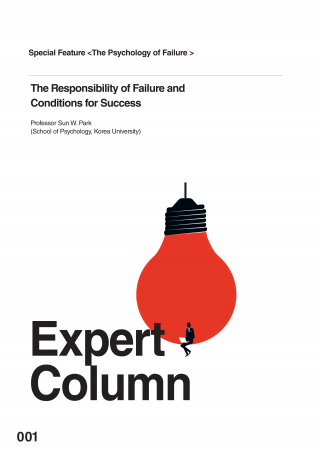 Expert ColumnThe Responsibility of Failure and Conditions for Success
Expert ColumnThe Responsibility of Failure and Conditions for Success2023-12-18
Professor Sun W. Park (School of Psychology, Korea University)
Special Feature <The Psychology of Failure > 3 The Responsibility of Failure and Conditions for Success Professor Sun W. Park (School of Psychology, Korea University)
Origin
Download -
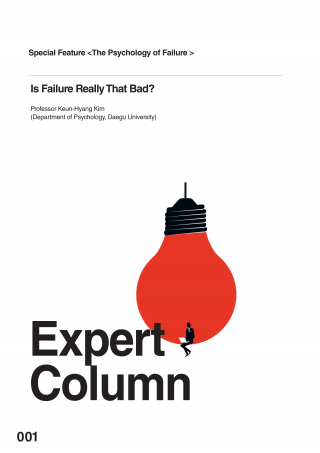 Expert Column
Expert Column2023-08-11
Professor Keun-Hyang Kim (Department of Psychology, Daegu University)
Is Failure Really That Bad? Special Feature <The Psychology of Failure > 2 Is Failure Really That Bad? Professor Keun-Hyang Kim (Department of Psychology, Daegu University) “Do you think success is that easy?”, “Is failure really that bad?” These are lines that parody off a rambling conversation between the main characters of the film <Decision to Leave>. My answer to both questions is “no” – success is definitely not easy, nor is failure that bad. However, it seems like there are plenty of people throughout the world who have achieved the difficult goal of success. Well, that is what it seems like on social media platforms like Instagram. On the other hand, even though failure is not as bad as we think, it still is not something people brag about, nor does it make us feel better. Because of these reasons, people who fail tend to avoid the spotlight and attention from others. The saying “people learn from their failures” has become so stale that people do not even bother to search for the lessons presented to them. Of course, not all life episodes have a clear-cut lesson on the surface, but they all can provide us with valuable insights if we look deeper; it is up to each individual to find and recognize them. You only live once, so rather than leaving our failures as painful and bitter memories, it would be better if we could slightly change our perspective (if it is difficult to transform a failure into something brighter, then at least try to change your mindset toward it – Koreans refer to this as a ‘mental victory’) to find silver linings in bad situations, which will help us recover psychologically and become more positive in life. With this in mind, I will give you list I made of some reasons why failure is not really that bad. Take note that my list does not consider the subject of the failure or the type of failure (e.g., breakups, loss of job, etc.).
Origin
Download -
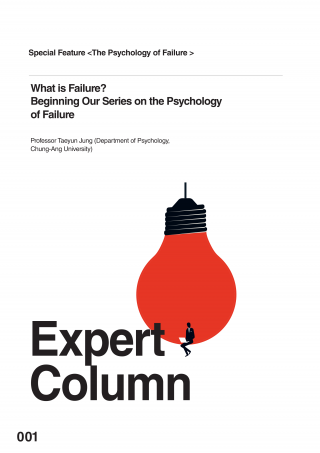 Expert ColumnWhat is Failure? Beginning Our Series on the Psychology of Failure
Expert ColumnWhat is Failure? Beginning Our Series on the Psychology of Failure2023-08-11
Professor Taeyun Jung (Department of Psychology, Chung-Ang University)
Special Feature <The Psychology of Failure > 1. What is Failure? : Beginning Our Series on the Psychology of Failure Professor Taeyun Jung (Department of Psychology, Chung-Ang University) We often assess the results of our actions as success or failure. On one hand, while such assessments are based on objective criteria, they can also be easily swayed by subjective opinions. If an outcome falls short of an objective set of standards or criteria, some may view the result as a failure, while others may describe it as a challenge. People also react differently to the result – some end up falling into despair while others see the result as an opportunity to try something new. What this tells us is that failure is not static and uniform; Rather, it can easily change depending on a wide range of factors. By widening our understanding of failure, we can explore more advantageous and adaptive ways to respond to our failure experiences.
Origin
Download -
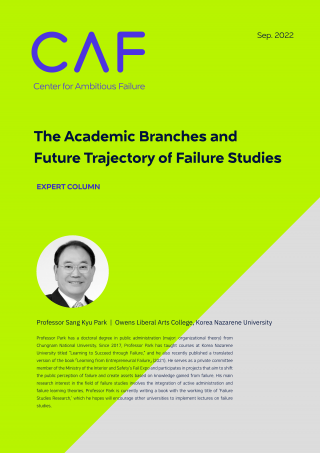 Expert ColumnThe Academic Branches and Future Trajectory of Failure Studies
Expert ColumnThe Academic Branches and Future Trajectory of Failure Studies2022-10-06
Sang Kyu Park (Professor, Owens Liberal Arts College, Korea Nazarene University)
Professor Sang Kyu Park | Owens Liberal Arts College, Korea Nazarene University Professor Park has a doctoral degree in public administration (major: organizational theory) from Chungnam National University. Since 2017, Professor Park has taught courses at Korea Nazarene University titled “Learning to Succeed through Failure,” and he also recently published a translated version of the book 「Learning from Entrepreneurial Failure」 (2021). He serves as a private committee member of the Ministry of the Interior and Safety’s Fail Expo and participates in projects that aim to shift the public perception of failure and create assets based on knowledge gained from failure. His main research interest in the field of failure studies involves the integration of active administration and failure learning theories. Professor Park is currently writing a book with the working title of ‘Failure Studies Research,’ which he hopes will encourage other universities to implement lectures on failure studies.
Origin
Download -
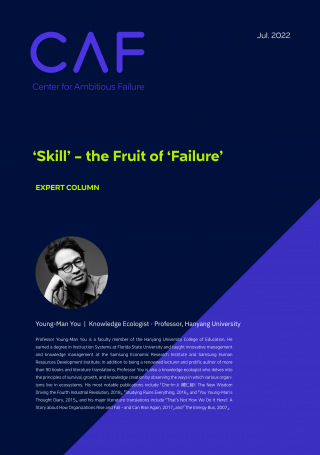 Expert Column‘Skill’ - the Fruit of ‘Failure’
Expert Column‘Skill’ - the Fruit of ‘Failure’2022-07-21
Young-Man You
<contents> - Failure drives us to find links, which can give birth to unexpected imagination. - A crumpled paper plane flies the furthest. - We need to fall over to be able to see other opportunities. - You can’t write a poem if you don’t start. - Great achievements do not appear out of thin air. Young-Man You | Knowledge Ecologist · Professor, Hanyang University Professor Young-Man You is a faculty member of the Hanyang University College of Education. He earned a degree in Instruction Systems at Florida State University and taught innovative management and knowledge management at the Samsung Economic Research Institute and Samsung Human Resources Development Institute. In addition to being a renowned lecturer and prolific author of more than 90 books and literature translations, Professor You is also a knowledge ecologist who delves into the principles of survival, growth, and knowledge creation by observing the ways in which various organ- isms live in ecosystems. His most notable publications include 「Che-In-Ji (體仁智): The New Wisdom Driving the Fourth Industrial Revolution, 2018」, 「Studying Ruins Everything, 2016」, and 「You Young-Man’s Thought Diary, 2015」, and his major literature translations include 「That’s Not How We Do It Here!: A Story about How Organizations Rise and Fall – and Can Rise Again, 2017」 and 「The Energy Bus, 2007」.
Origin
Download -
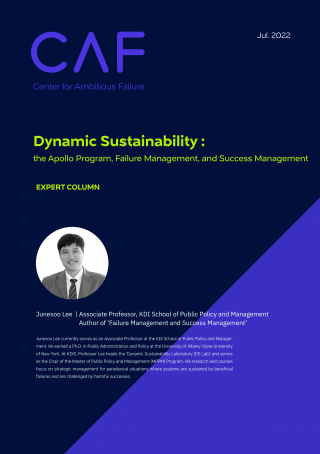 Expert ColumnDynamic Sustainability : the Apollo Program, Failure Management, and Success Management
Expert ColumnDynamic Sustainability : the Apollo Program, Failure Management, and Success Management2022-07-21
Junesoo Lee
"Contrary to how the term ‘sustainability’ has calm and static connotations, the process of achieving sustainability is highly dynamic. This is because the environment and reality around us are constantly changing. This gives rise to two paradoxes: failure can be beneficial, while success can be harmful. Ultimately, failure management is about managing the ‘benefits of failure’ and success management is about managing the ‘harms of success.’ More importantly, we must remember to pursue both failure management and success management if we are to surpass static sustain- ability and achieve dynamic sustainability." Junesoo Lee | Associate Professor, KDI School of Public Policy and Management Author of ‘Failure Management and Success Management’ Junesoo Lee currently serves as an Associate Professor at the KDI School of Public Policy and Manage- ment. He earned a Ph.D. in Public Administration and Policy at the University of Albany-State University of New York. At KDIS, Professor Lee heads the ‘Dynamic Sustainability Laboratory (DS Lab)’ and serves as the Chair of the Master of Public Policy and Management (MPPM) Program. His research and courses focus on strategic management for paradoxical situations where systems are sustained by beneficial failures and are challenged by harmful successes.
Origin
Download

